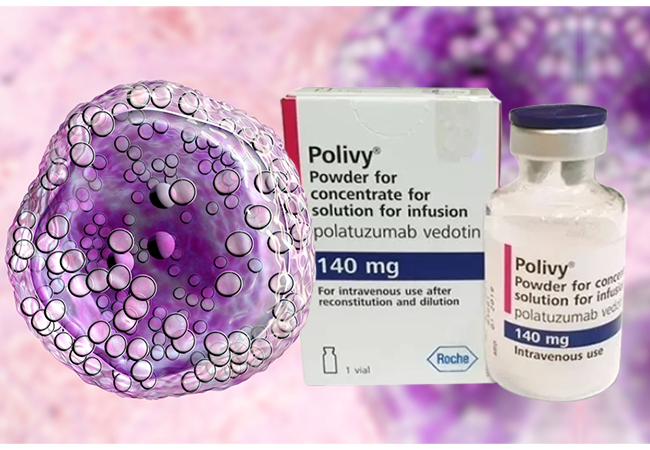In cancer treatment, breakthroughs often come with promises of hope. Polivy (polatuzumab vedotin) is one such breakthrough. It is designed to tackle a challenging type of lymphoma: diffuse large B-cell lymphoma (DLBCL). Polivy’s approach is unique and powerful, combining targeted action and a specialized delivery system to bring cancer treatment to a new level.
This promising therapy is provided as an injection: 30 mg or 140 mg as a single-dose vial of lyophilized powder; and is helping patients with DLBCL experience better outcomes with fewer side effects. Here’s a closer look at how Polivy works and why it’s making waves in cancer treatment.
How Polivy Targets Cancer Cells?
Polivy is like a guided missile for cancer cells. It belongs to a class of treatments called antibody-drug conjugates, which combine a monoclonal antibody (a protein that recognizes and attaches to specific cells) with a powerful cancer-killing drug. This antibody part of Polivy is specially designed to find and bind to a protein called CD79b. This protein is commonly found on the surface of cancerous B-cells, making it an ideal target for treating DLBCL.
The Monoclonal Antibody: A Direct Delivery System
The magic of this therapeutic drug lies in its precise delivery. When Polivy is introduced into the bloodstream, its monoclonal antibody component seeks out CD79b proteins, effectively “marking” cancerous B-cells. This careful targeting ensures that the drug is delivered where it’s needed most, allowing Polivy to focus its power directly on cancer cells while largely sparing healthy cells from harm.
The Cytotoxic Power Behind Polivy: Monomethyl Auristatin E (MMAE)
Polivy carries a cytotoxic agent called monomethyl auristatin E (MMAE), a potent drug with a powerful impact on cancer cells. On its own, MMAE would be too toxic for safe use, but Polivy’s antibody ensures MMAE reaches only the intended cancer cells. When Polivy binds to a cancer cell, it’s absorbed, and MMAE is released inside the cell. Once inside, it disrupts the cell’s internal machinery, specifically the microtubules needed for cell division. Unable to divide and multiply, the cancer cells eventually die off.
Why Polivy is Safer and More Effective Than Traditional Chemotherapy?
Traditional chemotherapy drugs affect all rapidly dividing cells, meaning healthy cells are often caught in the crossfire. Polivy’s precision-targeted approach, however, focuses almost exclusively on cancer cells. This reduces side effects, giving patients a gentler experience without sacrificing effectiveness. Clinical data shows that patients treated with Polivy have fewer severe side effects, which can make a huge difference in their overall treatment journey.
Recent Data: The Promise of Polivy
Polivy has shown impressive results in clinical studies. For patients with relapsed or refractory DLBCL, it has led to higher response rates and extended progression-free survival, meaning patients can enjoy longer periods without the disease progressing. In fact, recent trials indicate that Polivy offers a 40-50% improvement in overall survival rates for some patients compared to standard therapies, bringing renewed hope to those who may have exhausted other treatment options.
In India, Polivy is now more accessible, allowing patients here to benefit from this advanced treatment. With Polivy’s targeted approach, patients have a better chance at positive outcomes with fewer side effects than traditional therapies.
Conclusion:
Polivy’s unique approach to fighting DLBCL—by homing in on cancer cells and delivering a potent treatment precisely where it’s needed—represents a new direction in cancer care. With better survival rates, a reduction in side effects, and greater precision, Polivy is becoming a cornerstone in the battle against lymphoma. For those facing the challenges of DLBCL, Polivy offers a promising path forward, providing targeted power and compassionate care combined in a single treatment.
What types of lymphoma does Polivy treat?
Polivy is primarily used to treat diffuse large B-cell lymphoma (DLBCL), especially in cases where the disease has returned or not responded to other treatments.
How does Polivy differ from regular chemotherapy?
Unlike traditional chemotherapy, Polivy targets cancer cells directly, which helps reduce the side effects commonly associated with chemotherapy.
What are the side effects of Polivy?
While Polivy is gentler on healthy cells, some patients may still experience side effects like fatigue, fever, or low blood counts. However, these side effects are typically milder than those seen with standard chemotherapy.
Is Polivy available in India?
Yes, Polivy can be made available in India, offering patients an advanced option for treating challenging cases of lymphoma.
Can I buy Polivy online in India?
Yes, patients, clinicians or hospitals can buy Polivy online in India through the Indian Pharma Network (IPN) specializes in oncology medicines. However, it’s essential to ensure the platform is reputable and complies with medical regulations for safe purchasing
What are the primary uses of Trodelvy?
Trodelvy is approved for HR+/HER2- metastatic breast cancer, metastatic triple-negative breast cancer (mTNBC), and advanced bladder cancer. It serves patients who have previously received other treatments but need more effective options.
How effective is Polivy for DLBCL?
Polivy has been shown to improve response rates significantly in patients with relapsed or refractory DLBCL, providing better outcomes when other treatments haven’t worked.
What are the potential side effects of Trodelvy?
Common side effects of Trodelvy include fatigue, nausea, hair loss, and diarrhea. Although generally well-tolerated, some patients may experience severe side effects, and regular monitoring is essential during treatment.






